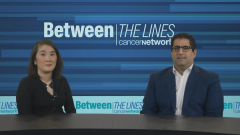
NSCLC: Moving Second-Line Therapies to Frontline Setting
Helena A. Yu, MD, and Joshua K. Sabari, MD, look to the future of frontline treatment in EGFR exon 20–mutated non–small cell lung cancer.
Episodes in this series

Transcript:
Joshua K. Sabari, MD: Helena, in line with using your best therapy first, now that these therapies are approved in the second-line setting, how do you see them moving to the frontline setting?
Helena A. Yu, MD: Absolutely. We know that these work and we know they’re well tolerated, and they lead to good quality of life. And so, the next natural step is can we move it even earlier and think about first-line treatment? I’m really excited. There are a bunch of ongoing studies looking at EGFR exon 20 insertion mutation drugs in the first-line space. In particular, PAPILLON, which is the study that looks at chemotherapy in combination with amivantamab [Rybrevant]. I think we really are eager to look at those results.
I think one thing that will also help us is there other farther-along studies of chemotherapy plus other EGFR inhibitors because the real question is when you combine 2 active treatments in the first-line setting, is that additive beyond just adding the sum of the benefit? Is there some synergy by hitting the cancer hard up front? I’m really excited about those studies.
Joshua K. Sabari, MD: Inone of the earlier studies that we looked at with chemotherapy plus amivantamab in the EGFR exon 20 insertion mutation population, we saw very high response rates, so I agree, I’m really excited about the data from the PAPILLON study. Hopefully, we’ll be able to see that data soon but that may move this combination into the frontline setting. Now again, the same question about IO [immuno-oncology]. This study really excludes IO. Does that harm you or is that a reason why people won’t utilize this in the frontline setting?
Helena A. Yu, MD: I don’t think so. As we talked about before, there really aren’t good data suggesting that there’s synergy between chemotherapy and immunotherapy for EGFR exon 20 insertion mutations. When we look at retrospective series in the later-line setting, the single agent response to immunotherapy for EGFR mutations is close to 0%. Thinking about what’s effective for this specific subgroup, it really would be the combination of platinum-doublet chemotherapy and EGFR exon 20 insertion mutation drugs like amivantamab.
Joshua K. Sabari, MD: I couldn’t agree more. We looked at a retrospective series, the IMMUNOTARGET, where we looked at patients with EGFR mutations and specifically focused on exon 20 insertion mutations for a cohort. The response rate was very low and progression-free survival was sub-2 months, so I agree. I think there is really no clear role for immunotherapy in the frontline setting, and I’m really excited to see the data for the PAPILLON study.
Helena, thank you for a fantastic discussion today. This was a lot of fun, and a really exciting opportunity for patients now with EGFR exon 20 insertion mutations. These are therapies that are FDA approved and are available for our patients. When you’re looking at your NGS [next-generation sequencing] reports, please differentiate the exon 20 insertion mutations from those more common exon 19 and 21 mutations and sit down with your patients to discuss these data. Thank you for your attention today. We really appreciate it.
Transcript edited for clarity.
Newsletter
Stay up to date on recent advances in the multidisciplinary approach to cancer.








































